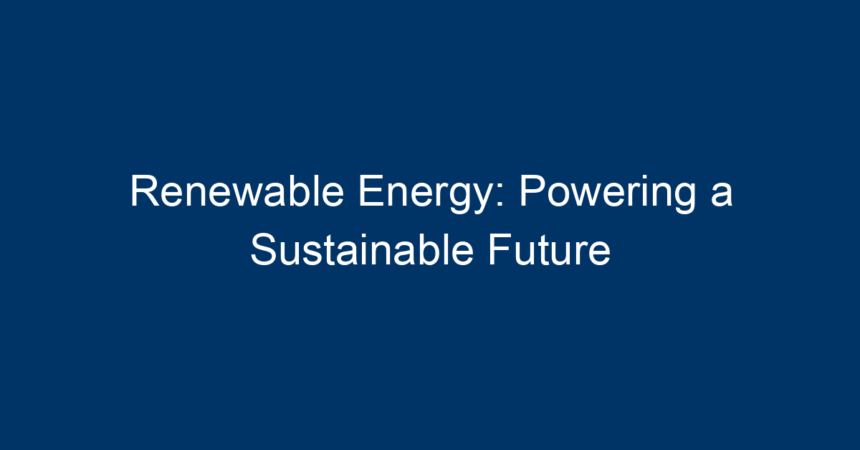As our planet grapples with the increasing challenges of climate change and resource depletion, the transition to renewable energy sources has never been more critical. Not only does renewable energy offer a sustainable and environmentally-friendly alternative to fossil fuels, but it also promises economic growth, energy independence, and a healthier planet. In this article, we’ll explore the various aspects of renewable energy, its benefits, types, challenges, and how we can all contribute to a sustainable future.
Understanding Renewable Energy
What is Renewable Energy?
Renewable energy refers to energy derived from resources that are naturally replenished on a human timescale. These resources include solar, wind, hydro, geothermal, and biomass. Unlike fossil fuels, which can take millions of years to form and contribute to environmental degradation, renewable energy sources are abundant and sustainable.
The Importance of Renewable Energy
The importance of renewable energy cannot be overstated. As global reliance on non-renewable energy sources has led to widespread environmental damage, shifting towards renewable energy can significantly reduce greenhouse gas emissions. This transition is vital for mitigating climate change and promoting environmental sustainability. Furthermore, renewable energy can provide reliable power to communities worldwide, particularly in remote areas with limited access to traditional electricity sources.
Types of Renewable Energy
Solar Energy
Solar energy harnesses sunlight using solar panels or solar thermal systems. It’s one of the most widely adopted renewable energy sources, thanks to falling installation costs and advances in technology. Solar panels can be installed on rooftops or in large solar farms, generating electricity for homes and businesses.
Benefits of Solar Energy
- Sustainability: Solar energy is abundant and will not run out.
- Low Operating Costs: Once installed, solar panels require minimal maintenance.
- Energy Independence: Countries can harness their solar resources, reducing reliance on imported fuels.
Wind Energy
Wind energy is generated using turbines that convert wind kinetic energy into electrical power. Onshore and offshore wind farms have seen significant growth, providing clean energy and job opportunities in rural and coastal areas.
Benefits of Wind Energy
- Clean Energy Source: Wind energy produces no emissions during operation.
- Scalability: Projects can range from small installations to large, utility-scale farms, making wind energy adaptable for various needs.
Hydro Energy
Hydropower, or hydro energy, utilizes the flow of water to generate electricity. Dams and water flow systems capture the kinetic energy of moving water, converting it into usable electrical power.
Benefits of Hydro Energy
- Reliable Power Supply: Hydropower plants can produce large amounts of electricity consistently.
- Multi-Use Water Bodies: Dams can help with flood control, irrigation, and recreational activities.
Geothermal Energy
Geothermal energy taps into the Earth’s internal heat, often using steam or hot water from underground reservoirs to create electricity or provide heat directly.
Benefits of Geothermal Energy
- Constant Energy Source: Geothermal energy is available 24/7, unlike solar and wind energy, which depend on weather conditions.
- Low Emissions: It produces very few emissions compared to fossil fuels.
Biomass Energy
Biomass energy is derived from organic materials, such as plant and animal waste. It can be converted into biofuels, electricity, and heating.
Benefits of Biomass Energy
- Waste Reduction: Biomass energy helps manage waste by transforming it into valuable energy.
- Carbon Neutral: When managed sustainably, biomass energy can be considered carbon neutral since the carbon dioxide released during combustion is offset by the CO2 absorbed during the growth of the plants used.
The Benefits of Transitioning to Renewable Energy
Environmental Benefits
The most compelling advantage of renewable energy is its reduced impact on the environment. Shifting to renewable energy sources can dramatically lower greenhouse gas emissions, air pollution, and water consumption associated with traditional fossil fuels.
Economic Advantages
Investing in renewable energy can stimulate economic growth. The renewable sector is increasingly creating jobs, from manufacturing to installation and maintenance. Additionally, many renewable energy projects are becoming economically viable without subsidies, leading to long-term savings for consumers.
Energy Security
As countries shift to renewable sources, they also protect themselves from price volatility and supply disruptions associated with fossil fuels. This independence allows nations to secure their energy needs sustainably and responsibly.
Challenges Facing Renewable Energy Adoption
Technological Hurdles
While technology in renewable energy has advanced significantly, there are still challenges to overcome in efficiency, storage, and grid compatibility. Energy storage solutions are critical for managing supply and demand, particularly for solar and wind energy, which are intermittent by nature.
Policy and Regulatory Issues
Transitioning to renewable energy often requires supportive policies and regulations. Governments must create frameworks that encourage investments in renewable technologies and address any market barriers that hinder progress.
Public Awareness and Acceptance
Public perception can significantly impact the adoption of renewable energy. Increasing awareness about the benefits and feasibility of renewable technologies is vital for garnering support and acceptance from communities.
How You Can Contribute
Advocate for Change
Engage with your local representatives and advocate for policies that support renewable energy development. Encourage investments in solar panels, wind turbines, and other renewable technologies in your community.
Educate Yourself and Others
Knowledge is power. Educate yourself about renewable energy options available in your region and share this information within your networks. The more people understand the benefits, the more likely they are to make sustainable choices.
Make Sustainable Choices
Consider adopting renewable energy technologies in your own home, such as solar panels or energy-efficient appliances. Additionally, practice energy conservation methods to reduce your carbon footprint.
Conclusion: Embracing a Sustainable Future
The transition to renewable energy is not just a trend; it is an essential step toward a sustainable future. With its vast benefits—environmental, economic, and social—renewable energy presents a viable solution to some of our most pressing global challenges. By understanding the different types of renewable energy sources, their advantages, and the barriers we face, we can work collectively toward a cleaner, healthier planet.
Take action today. Advocate for renewable energy policies, educate yourself and others, and make sustainable choices for a brighter tomorrow. Together, we can power a sustainable future through the transformative potential of renewable energy.




